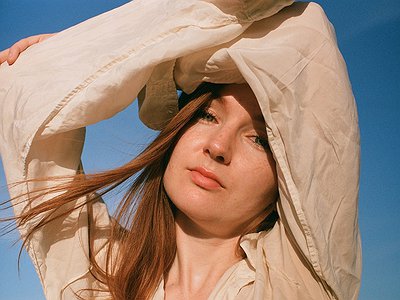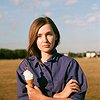Take us through a day in your life, from a possible morning routine through to your work, please.
I’m always working on a few different projects at once, and so I rarely have a typical day. But, if I’m in a period of writing, on a retreat, for example, I will stick to a routine.
I’ll get up early and do morning pages, as recommended by The Artist’s Way by Julia Cameron. This really helps ground me in the present moment, and clear out any anxieties and lingering dreams before beginning to write. Then I’ll write until my body needs to move. I can probably do 2-3 hours. It might be laying down the bare bones of a new song, finishing something off, or recording a demo of something I’ve half-written so that I can listen back to it and figure out what it needs. Then I’ll go out and move my body, usually listening back to something I’ve written.
After lunch, I’ll work more on the music, usually quite obsessively until I feel I’ve reached a point I can’t go beyond without going a bit mad. Then I’ll do some yoga to help my aching back and shoulders, and then probably another walk before settling down for the evening. I try to keep the evening for relaxation, but I do find that the darkness tends to conjure creativity, which can be annoying if I’m tired after a day’s writing, but you have to go with it if it comes to visit.
I tend to work in these intense bursts for a week or so, then take a few weeks off writing to work on other projects, or play live.
Could you describe your creative process on What I Wanted, please?
Most of the songs on What I Wanted were written and produced in collaboration with my friend Will Gardner, who is a composer and arranger based in North London.
We met up a few times after the first lockdown had been lifted in 2020, both wanting to try out new ideas with a new collaborator. I had done bits of co-writing before, but never felt particularly satisfied by it, partly because of my own insecurities, but also because I don’t think I was working in a way that suited me.
With Will, we would often come up with some musical ideas together, mostly on the piano, record something, then put it up on dropbox. I’d then re-visit these ideas on long walks, and come up with melodies and lyrics, that I’d then take back to Will. We’d put the song together, editing and revising and progressing things collaboratively. It was genuinely a lot of fun, and pushed me to make things I never would have made on my own.
I think the melodies on this record are my strongest yet, and the production is interesting, without losing sight of my acoustic roots.
Listening can be both a solitary and a communal activity. Likewise, creating music can be private or collaborative. Can you talk about your preferences in this regard and how these constellations influence creative results?
For the first few years of my career, I only ever wrote songs alone. I didn’t like co-writing; it felt forced to me, and only ever resulted in a watering down of my artistic voice.
But now I realise that a) I wasn’t working with the right collaborators and b) my own lack of confidence was creating insecurities that made it hard for me to fully commit to collaborations. It takes a lot of courage to put your ideas out to someone, especially when they’re baby ideas; only part-formed and in need of a lot of work. Finding a collaborator I feel comfortable with, then, is crucial.
What I Wanted was the first collaboration that’s really worked for me: I think the songs combine the best of both of mine and Will’s skills and couldn’t have been made by one of us alone. It worked, I think, because we have different skills to bring to the table, and because we were friends to begin with, rather than two songwriters with similar skills being put together by an outside influence.
Now I like a mixture of private and collaborative work. I still feel as though the truest form of self-expression can only be achieved if I write on my own in a dark room late at night, but the melodies and structure of a song can be made catchier and hookier with the help of another person.
Maybe collaboration, in all areas of life, is something we get better at as we get older, as we grow in our own self of sense? Maybe, ironically, you need to feel strong in yourself before you can let someone else help you?
How do your work and your creativity relate to the world?
I remember reading in a Copenhagen art gallery that there are three points to any artist’s work: their biography, their artistic moment, and the time in which they’re living. I really liked this (though I admit I am drawn to simplistic explanations of complex things!). I suppose my work is relating to these three points at all times. I’m writing about my life, I’m relating to my musical moment and the work of other artists, and I’m writing about ‘the world’, as I see it. Or maybe I should say ‘my world’, as there isn’t just one.
For this album, I wanted to write not just about my own life, relationships and history, but about the values I felt were shaping our culture. For me, that means consumerism and capitalism, and the effects they have on mental health and on the planet. These things are all inter-related, of course. I wanted to use the narrator of the songs to explore how these issues might manifest in someone’s personal life: songs like “When it Comes for You” and “Can’t Get Enough of What I Don’t Need” explore how the personal and political intersect.
Whether it worked is up to the listener, I suppose.
Art can be a way of dealing with the big topics in life: Life, loss, death, love, pain, and many more. In which way and on which occasions has music – both your own or that of others - contributed to your understanding of these questions?
I’m so grateful that I have a means of expressing difficult experiences through music.
It’s a cliche that artists are a bit mad, but if anything I think it’s the other way around: we have an outlet for the difficulties of life. I’ve often wondered how people deal with these feelings if they don’t make art? Writing songs has been for me a form of alchemising loss, pain and heartbreak. It’s transformational, by which I mean it allows pain to be transformed into something else, and yet not be diminished in the process.
That’s why I’m passionate that making art can’t be left only to professional artists. My work with Live Music Now – performing and songwriting with and for special schools, hospitals, care homes and mental health units – has taught me the power of music in everyone’s lives.
It was on one of these Live Music Now projects, working in collaboration with Emily of The Staves, that I met a woman who was living in a homeless shelter in West London. She played us a song that she’d written and it could have been a Joni Mitchell B-side. She played and sang beautifully, with passion and truth. And it was only for herself. She wasn’t trying to make money from it, or increase her following on social media. She made it because she could, and because she needed to. And it was brilliant.
It reminds me of what a friend said to me recently: art should be made by everyone, all of the time.
How do you see the connection between music and science and what can these two fields reveal about each other?
I don’t know enough about science to give an intelligent answer, but I do think that the division between ‘arts’ and ‘sciences’ in education is ridiculous. It seems to me that scientists and artists have pretty similar practices. Have a question or an idea, perform an experiment, reflect on the results. Imagination plays a huge role in both fields, as do courage and curiosity. And both processes require repeating and refining until we’re happy(ish) with the results.
The division between the two sets up a binary of personality types. Are you sensible (and uptight) or creative (and scatty)? We are all everything all at once.
Creativity can reach many different corners of our lives. Do you feel as though writing or performing a piece of music is inherently different from something like making a great cup of coffee?
I believe that creativity is a human need, as Jung wrote. We need it, like we need to eat and exercise and connect with other people. I don’t suppose the form of creativity matters so much as the act of expression. I hear people say that cooking is an act of creativity for them, and I wish I felt the same way.
For me, I’m pretty obsessively devoted to writing music and prose (I’m working on my first novel at the moment), and so mostly I don’t feel I have any creative energy left for cooking or coffee or whatever it is. I want to keep all of that energy for my work. With songs, a musical and a novel in the works, I need a lot.
Which I’m aware is probably unhealthy, and difficult to live with, but it’s the way I am, for the moment at least. Maybe one day that will change, and I’ll feel fulfilled by baking, or gardening, or a good cushion arrangement.
Music is vibration in the air, captured by our ear drums. From your perspective as a creator and listener, do you have an explanation how it able to transmit such diverse and potentially deep messages?
Music is magic.



